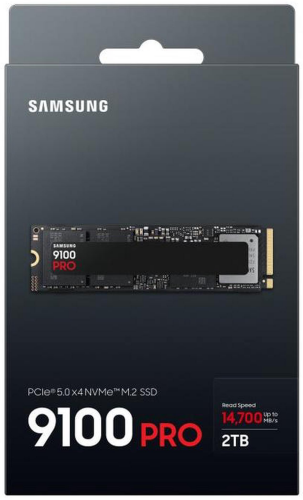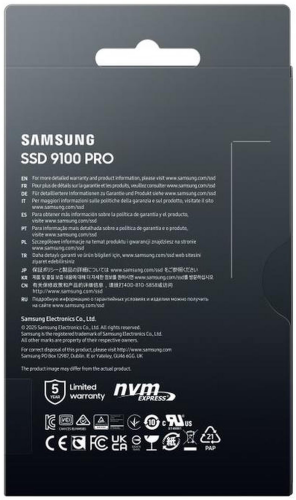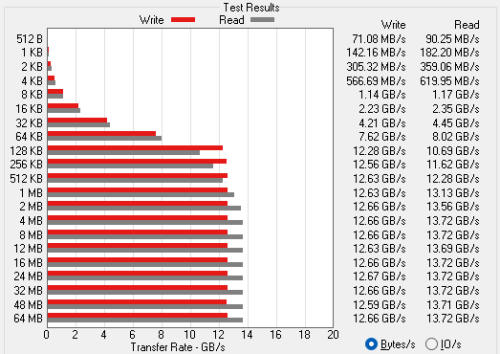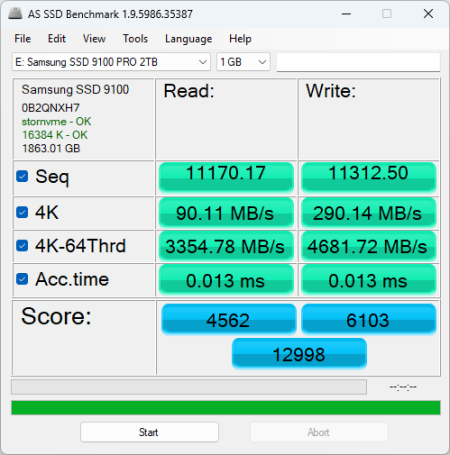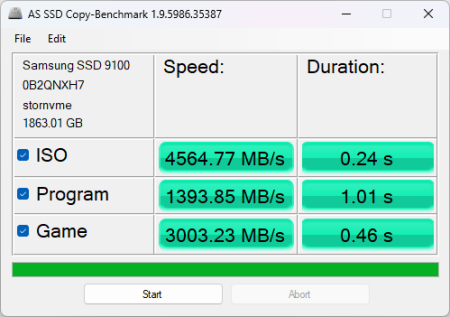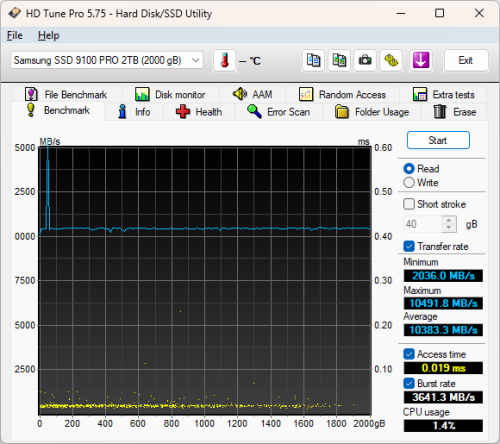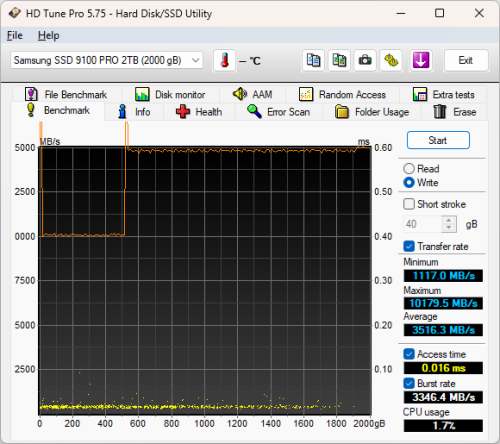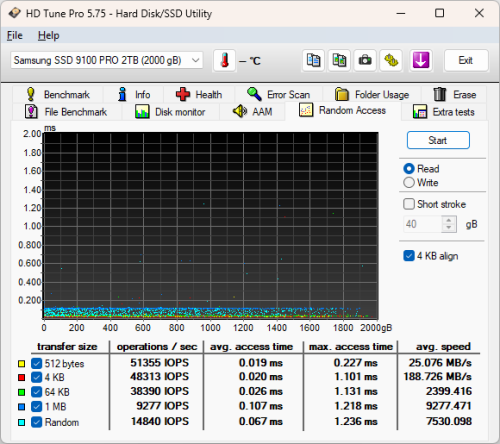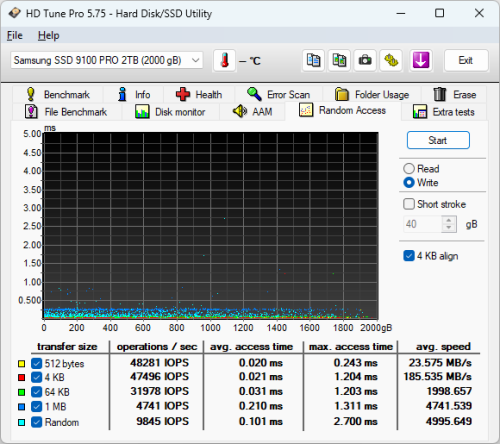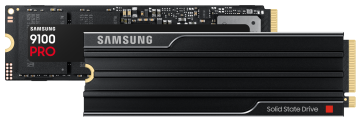
![]()
Model: Samsung 9100 PRO 2TB PCIe 5.0 NVMe Solid State Drive
Manufacturer: Samsung Electronics
Provided By: Samsung America
Samsung Electronics has been a leader in the electronics industry for more than 30 years. Since the introduction of their first television in 1970, this Korean company has grown to become one of the world's leading electronics manufacturers, offering everything from tiny semiconductors to large home appliances. Samsung is no stranger to the storage industry either. Along with an assortment of DVD and Blu-ray Disc drives, the company offers both hard drive and flash based storage solutions for the portable and desktop computer markets.
Samsung recently introduced its first high-performance PCIe 5.0 SSD, the 9100 PRO. Designed for enthusiasts, gamers and AI-driven creators, this M.2 form factor drive is powered by Samsung's advanced 5nm "Presto" controller and is available with up to 8TB of their latest 8th generation V-NAND flash. The 9100 PRO is also available with or without a heatsink and is equipped with an ultra-fast PCIe 5.0 x4 NVMe 2.0 interface to deliver twice the performance and 49% greater power efficiency than the 990 PRO. To top it all off, the drive offers a long list of features including Samsung's Intelligent TurboWrite 2.0 technology, hardware-based encryption and support for the company's Magician software.
The 9100 PRO is available in 1TB, 2TB, 4TB and 8TB (coming in second half of 2025) capacities. For this review, Samsung sent us the 2TB version of the drive, which is capable of delivering up to 14,700 MB/s sequential read and 13,400 MB/s sequential write speeds as well as up to 1,850K random read and 2,600K random write IOPS.
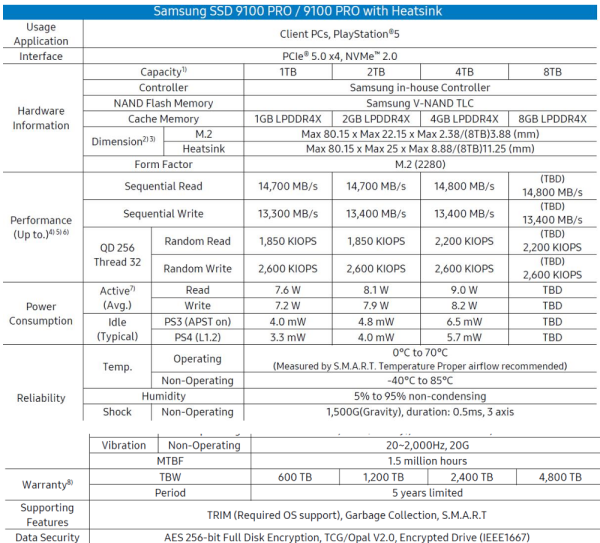
Needless to say, this is only a taste of what the 9100 PRO has to offer. To give you an idea of what to expect, we'll take a closer look at Samsung's new PCIe 5.0 SSD and then see how well it performs. Does the 9100 PRO have what it takes? Can it deliver the performance and features that we've come to expect from Samsung? Keep reading as we find out.
The 9100 PRO comes in a small, dark gray box. Along with a picture of the drive, the packaging advertises a number of its key features including its 2TB capacity, PCIE 5.0 x4 NVMe interface, maximum read speed and 5 year warranty. Inside, you'll find the SSD as well as a small installation guide and warranty statement.
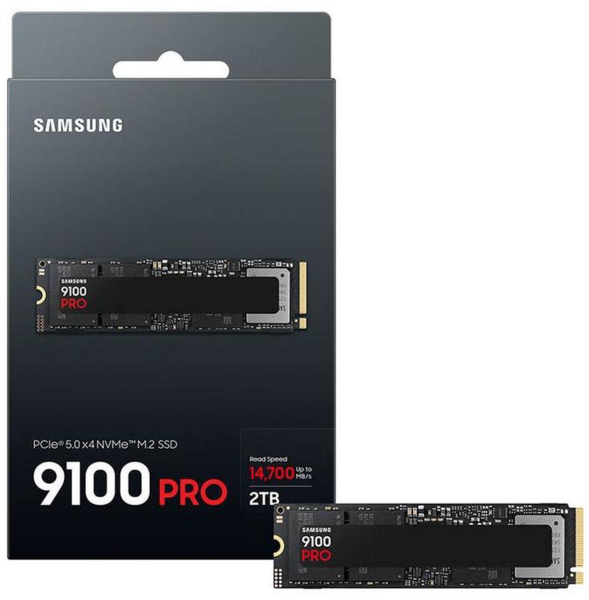
Physical Features:
The 9100 PRO uses the 2280 form factor for M.2 (NGFF) SSDs. It measures 80.15 x 22.15 x 2.38 mm and tips the scales at a mere 9.0g. The drive also has an "M key" edge connector which provides PCIe SSDs with up to 4x lanes of bandwidth.

Like the PM9E1, the 9100 PRO utilizes Samsung's "Presto" (S4LY027) controller. Manufactured using a 5nm process, this PCIe 5.0 x4 NVMe 2.0 controller is equipped with a 5-core ARM Cortex R8 processor and has 8 NAND channels with 4 chip enables (CE) per channel.

For the 2TB version of the 9100 PRO, Samsung has used their own 8th-generation 236-layer TLC V-NAND flash chips. Looking at the pictures above, you can see that there are two 1TB NAND flash packages on the top of the PCB. The drive also has a single 2GB LPDDR4X DRAM memory chip that is used for caching.
The Samsung Magician software is designed to help users easily monitor the health and maximize the performance of their Samsung SSD. From the main screen, users can check the condition of their drives and view information like the temperature, total and available capacities and the total bytes written.
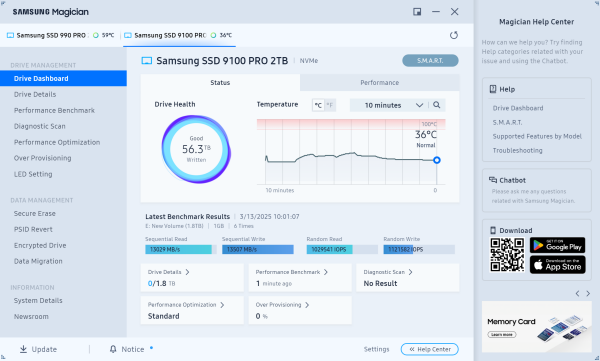
Magician also provides detailed information about each drive. In addition to the drive health and temperature, this screen shows the serial number, firmware version, which NVMe driver the drive is using and the speed of the PCIe slot it's plugged into. You can even see which volumes are on the drive and how much of the total capacity they are using.
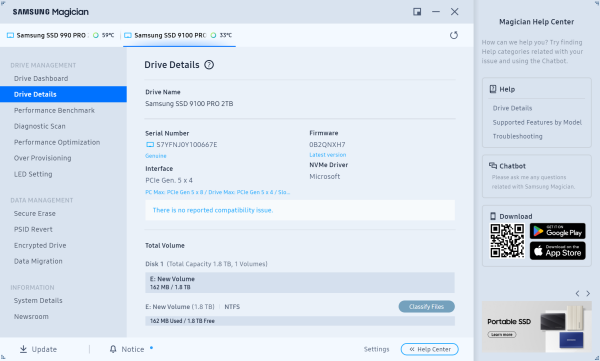
Samsung's Magician software can also be used to benchmark the performance of a storage device. Looking at the screenshot below, you can see that it tests the sequential and random read and write performance of a drive. Users can also compare these scores with past results to maintain the highest performance possible.
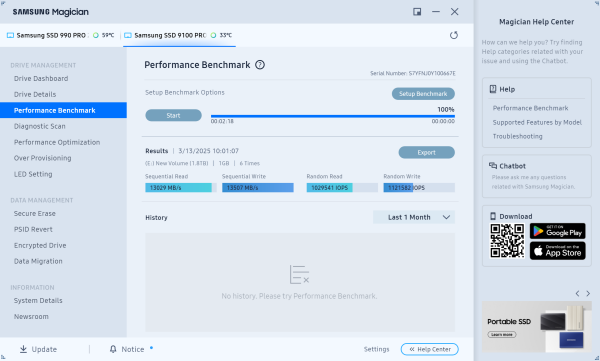
Using Magician, users can also do a diagnostic scan to find and fix any errors and optimize the performance and lifespan of their SSD by setting aside extra free space.
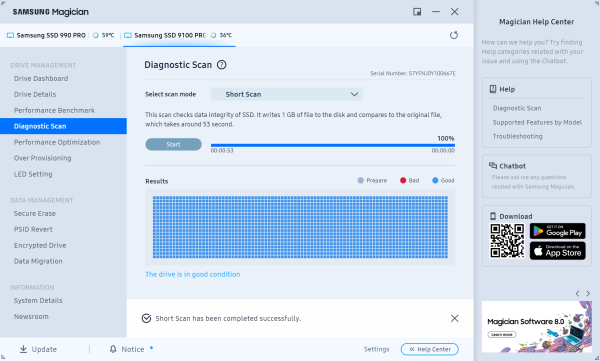
Magician also gives users the ability to optimize the performance of their SSD. Along with the ability to enable or disable TRIM, the software gives you the ability to enable what they call "Full Power Mode" which disables low power states such as device sleep. As a result, the 9100 PRO runs at peak levels so that it maintains a nonstop, consistent high performance.
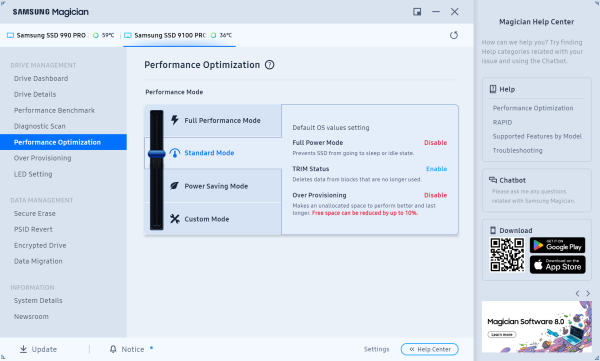
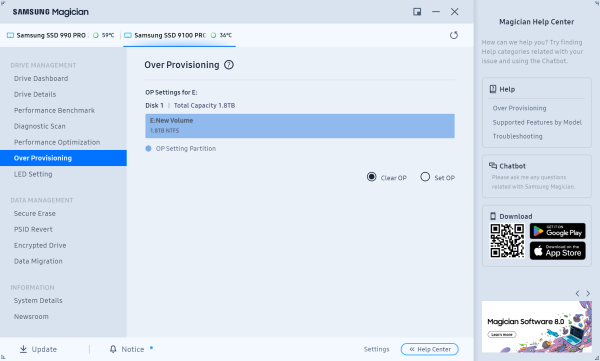
Samsung's Magician software also includes a number of data management features. Along with the ability to permanently delete sensitive data, it can unlock and reset your drive to its factory setting by entering the 32-character PSID password printed on the drive label. In addition, Magician gives you the ability to activate Encrypted Drive to protect private and sensitive data. The software lets you review your drive’s current security settings and helps you with the setup process.
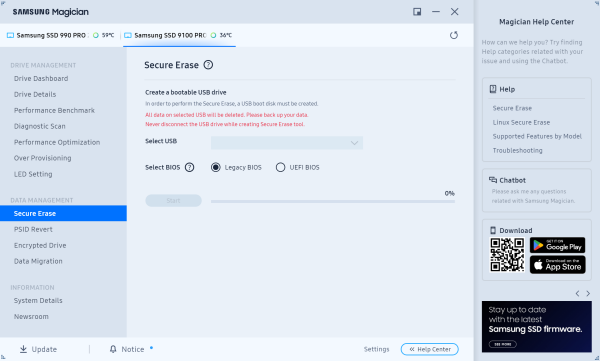
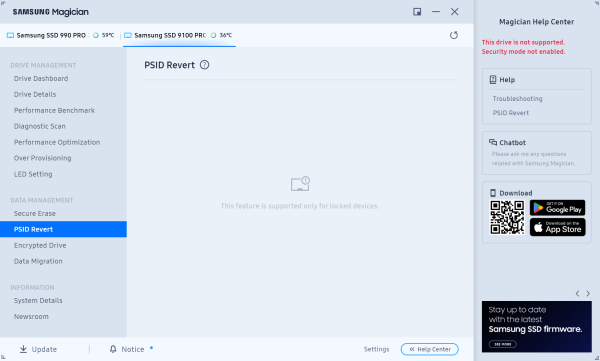 |
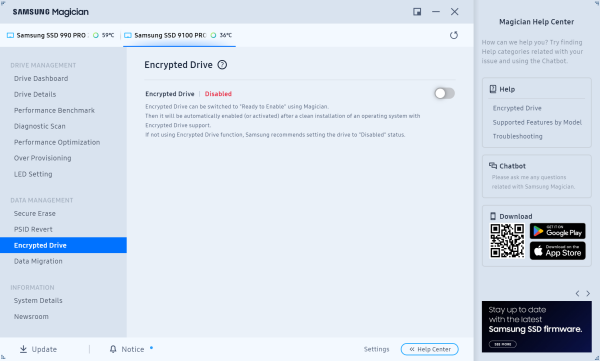 |
Last, but not least, Magician gives you the ability to easily migrate your operating system, application software and user data from your existing storage device to your new Samsung SSD. Take note that only the source drive on which the operating system is installed can be migrated.
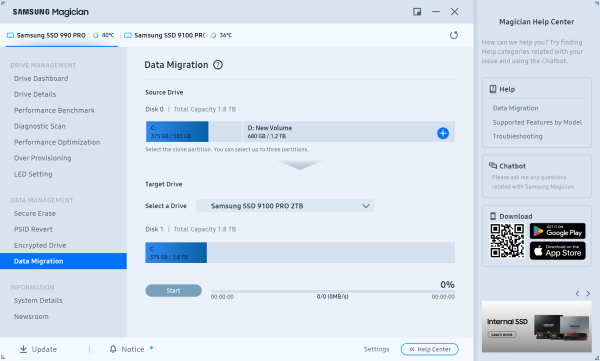
The test system used in this review is equipped with an AMD Ryzen 9 7900x CPU, Gigabyte B650E AORUS master motherboard, 32GB (16GB x 2) of Corsair Vengeance 5200MT/s DDR5 memory, Samsung 990 Pro 2TB SSD and a GIGABYTE GeForce GTX 1060 WINDFORCE OC 6G graphics card. For the operating system, I used the latest version of Windows 11.
To test the performance of Samsung's 2TB 9100 PRO SSD, I ran a series of benchmarks using CrystalDiskMark, ATTO Disk Benchmark, AS SSD, HD Tune Pro, Anvil's Storage Utilities, Iometer and PCMark. For comparison, I've also included test results from the Netac NV7000-Q, Crucial P310 2280, Samsung 990 EVO Plus, Silicon Power MS70, Crucial P310 2230, Crucial T705, Silicon Power US75, Samsung 990 EVO, Silicon Power PX10, Crucial T500, ADATA SE920, ADATA LEGEND 970, Crucial T700, Solidigm P44 Pro, Samsung 990 PRO, ADATA LEGEND 960, Crucial P3 Plus, SK hynix Platinum P41, Silicon Power XS70, WD_BLACK SN770, ADATA XPG ATOM 50, ADATA XPG GAMMIX S70 Blade, Crucial P5 Plus, Plextor M10PY, ADATA XPG GAMMIX S70, Sabrent Rocket 4 Plus, WD_BLACK SN850, Silicon Power US70, ADATA XPG GAMMIX S50 Lite, Crucial X10 Pro, Crucial X9 Pro, ADATA Elite SE880, Kingston XS2000, ADATA XPG ATOM 30, Samsung 980, Silicon-Power UD70, Crucial P2, SK hynix Gold P31 and Crucial P5.
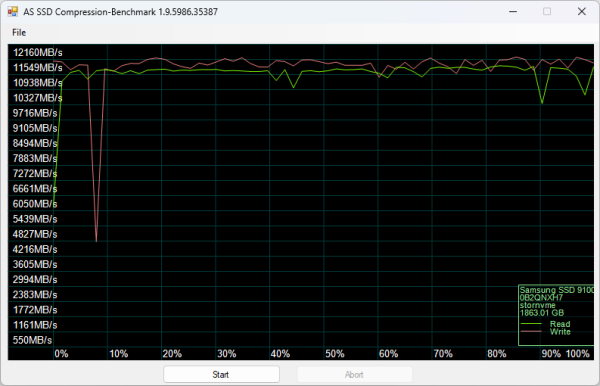
As I mentioned earlier, the 9100 PRO uses Samsung's "Presto" (S4LY027) controller chip. Looking at the screenshot above, you can see that it performs equally well with both incompressible (0%) and compressible (100%) data.
CrystalDiskMark 8.0.4:
First, I ran a few quick tests using CrystalDiskMark. This benchmark measures the performance of a storage device by testing its sequential and random read and write speeds. For this test, we're using the peak and real world profiles.
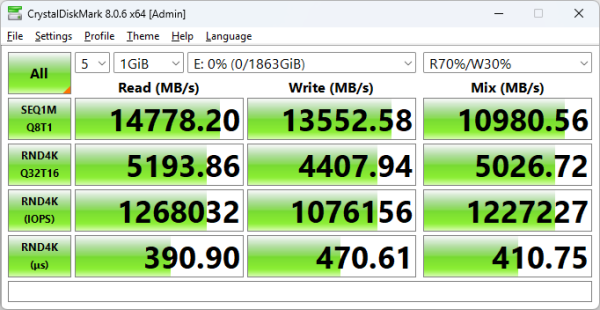
According to Samsung, the 2TB 9100 PRO is capable of reading at 14,700 MB/s and writing at 13,400 MB/s. As you can see, the drive had no problems reaching these speeds in CrystalDiskMark's sequential read and write tests.
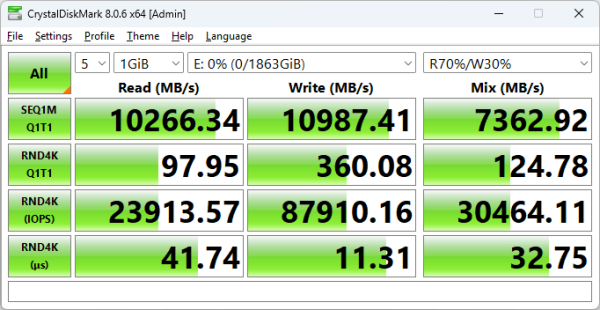
As you'd expect, the 9100 PRO wasn't as fast when tested with the "real world" profile which uses a single thread and a much lower queue depth. Nevertheless, it was still able to read at 10,266 MB/s and write at more than 10,900 MB/s.
ATTO Disk Benchmark 4.01:
I also used ATTO Disk Benchmark to test the 9100 PRO's sequential read and write speeds. The tests are run using blocks ranging in size from 512B to 64 MB and the total length set to 256MB.
When tested with ATTO, the 9100 PRO's read speeds topped out at about 13.72 GB/s and its write speeds at 12.67 GB/s.
AS SSD:
AS SSD is a relatively new benchmark designed specifically for solid state drives. The application contains five synthetic tests used to determine the sequential and random read and write performance of a drive.
AS SSD also includes a copy benchmark. This test copies an ISO (two large files), program (many small files) and game (small and large files, returning the speed and duration of each.
HD Tune Pro 5.75:
Next, I ran a series of tests using HD Tune Pro. This hard disk utility measures a drive's performance by testing its sequential read and write speeds as well as its access time, burst rate and CPU usage. For this review, I'm also going to use it to benchmark the 9100 PRO's random read and write speeds, random access times and the number of operations per second.
The 9100 PRO performed relatively well when benchmarked with HD Tune. The drive had average read and write speeds of 10,383.3 MB/s and 3,616.3 MB/s, respectively.
When writing 4KB blocks, the 9100 PRO reached 47,496 IOPS and had an average speed of 185.535 MB/s. The drive was even faster when reading, reaching 48,313 IOPS with an average speed of 188.726 MB/s.
Anvil's Storage Utilities:
Anvil's Storage Utilities is another benchmark designed with SSDs in mind. The standard storage benchmark measures a drive's performance by testing its transfer speeds, access times and IOPS.
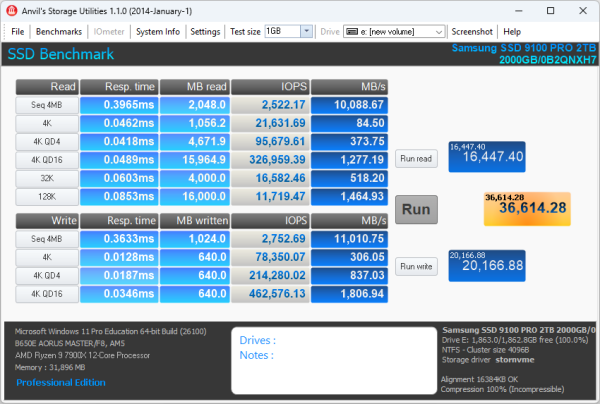
Iometer:
Lastly, I ran a series of tests using Iometer. This tool can be configured to benchmark a number of things. In this case, I used it to measure the 9100 PRO's read and write speeds and the number of operations per second. The tests were run using random bytes and a queue depth of 3.
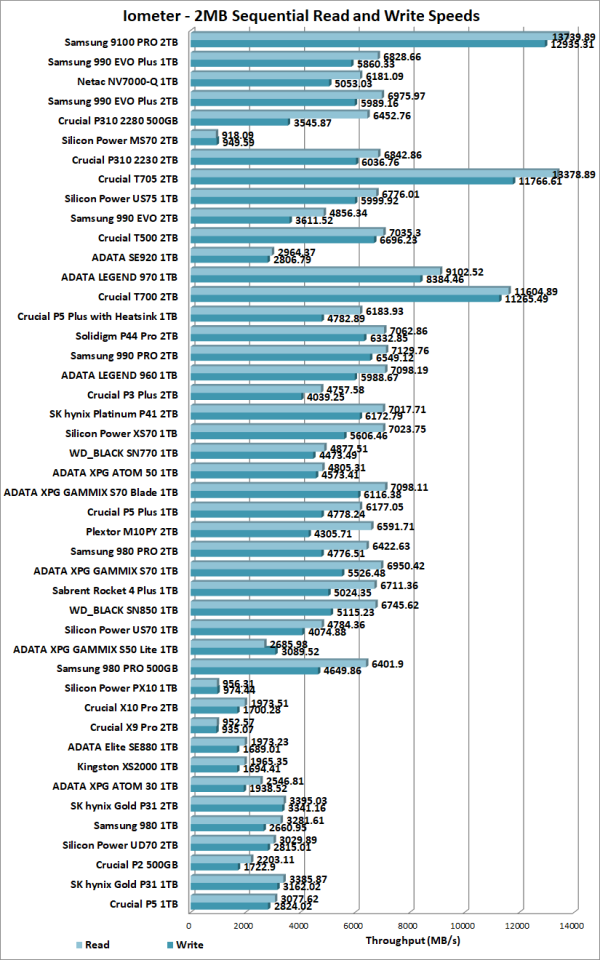
The 9100 PRO's performance was very similar to what we saw in our other tests. The drive was able to read at 13,739.89 MB/s and write at 12,935.31 MB/s.
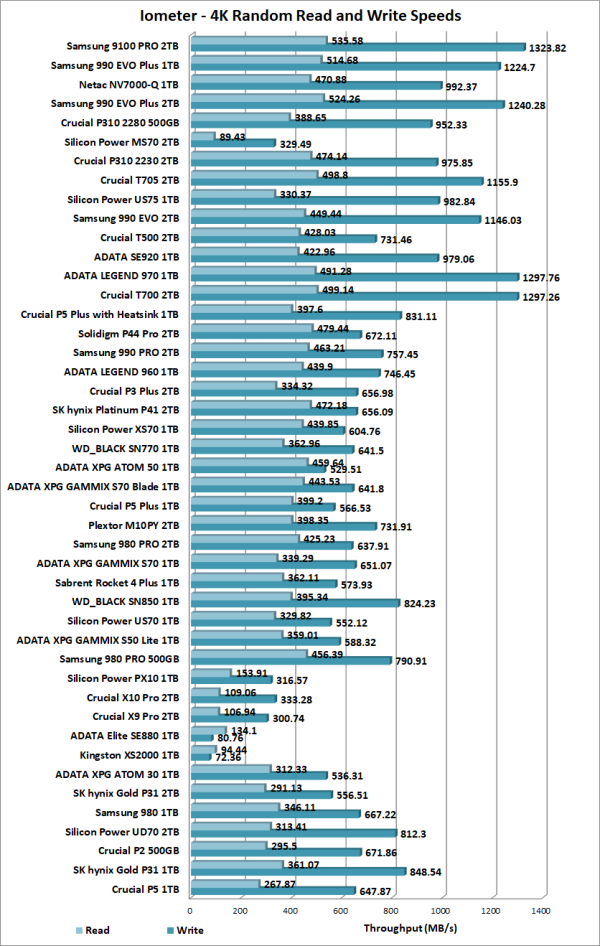
The 9100 PRO also performed very well when doing random reads and writes. In our tests, the drive was able to read at 535.58 MB/s and write at a blazing 1,323.82 MB/s.
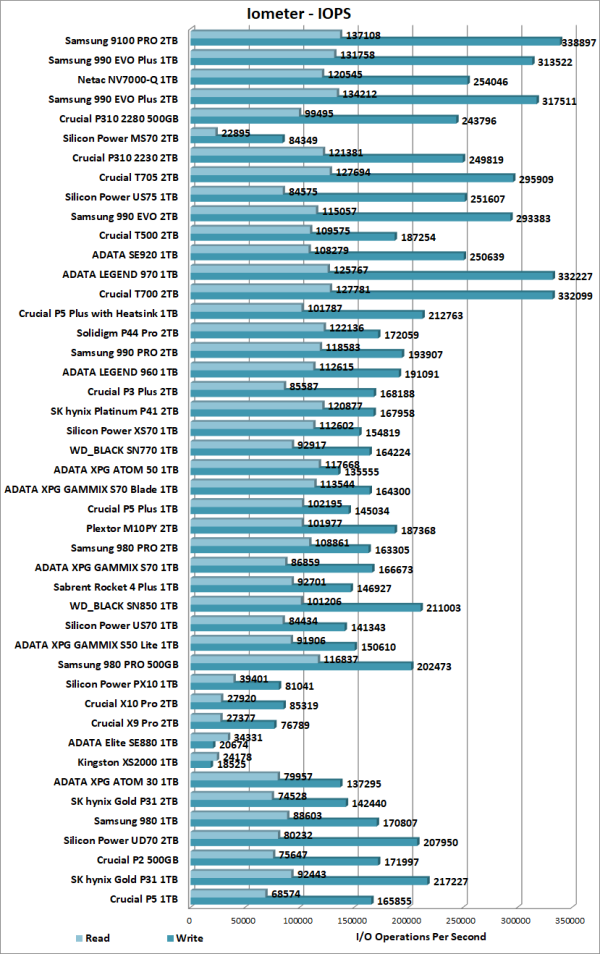
According to Samsung, the 2TB 9100 PRO is capable of 1,850K IOPS when reading and 2,600K IOPS when writing 4K blocks with 32 threads and a queue depth of 256. With two threads and a queue depth of three, the drive reached 137,108 random read IOPS and 338,897 random write IOPS.
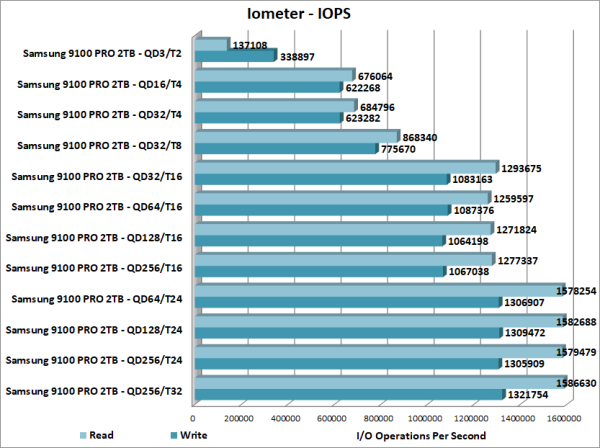
As with most drives, the 9100 PRO performed better with more threads and at higher queue depths. With 24 threads and the queue depth set to 256, it reached 1,579,479 random read IOPS and 1,305,909 random write IOPS. Sadly, I could not push the 9100 PRO any harder as the number of threads I could run within Iometer was limited by the processor in our test system. Needless to say, if you want to hit that magic 2,600K number, you'll probably want to pair the drive with a processor that has 16 or more cores, like the AMD Ryzen 9 or Intel Core i9.
PCMark 8 - Storage Test:
PCMark 8 is a complete benchmark for Windows. It includes five benchmark tests, each designed around a specific scenario. The storage benchmark measures drive performance using real-world traces recorded from Adobe Creative Suite, Microsoft Office and a selection of popular games.
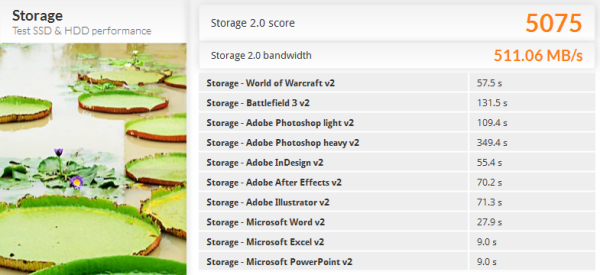
PCMark 8 also includes a consistency test which measures the performance consistency and degradation tendency of a storage system. The test reports the performance level at the start, the degraded steady-state and the recovered state as well as the number of iterations required to reach the degraded state and the recovered state. For this test, we are focusing on the Adobe Photoshop (Heavy) trace and will look at both the bandwidth and latency of the drive
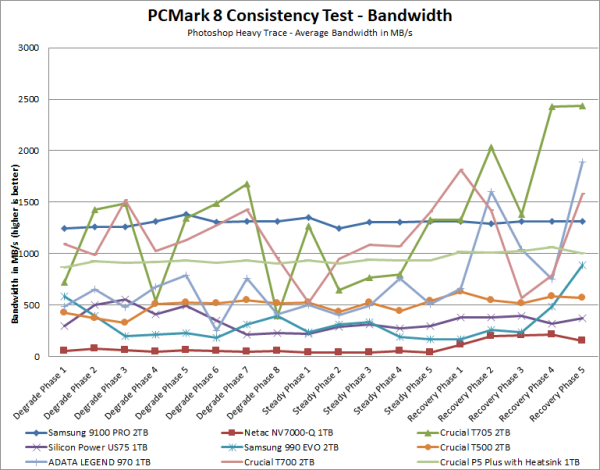
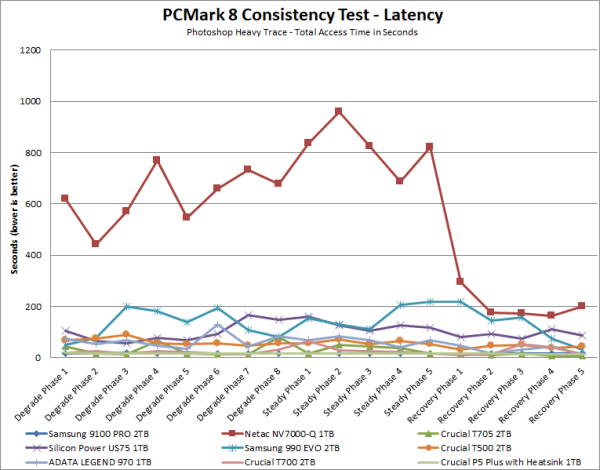
The 9100 PRO did quite well throughout PCMark's consistency test. The average bandwidth stayed above 1200 MB/s throughout the degradation and steady state phases and peaked at 1312 MB/s during the recovery phase.
PCMark 10 - Full System Drive Benchmark:
PCMark 10's Full System Drive Benchmark uses a wide-ranging set of real-world traces from popular applications and common tasks to fully test the performance of the fastest modern drives. This benchmark produces an overall score as a measure of drive performance. Comparing devices is as simple as comparing scores. The tests also measure and report the bandwidth and average access time performance for the drive.
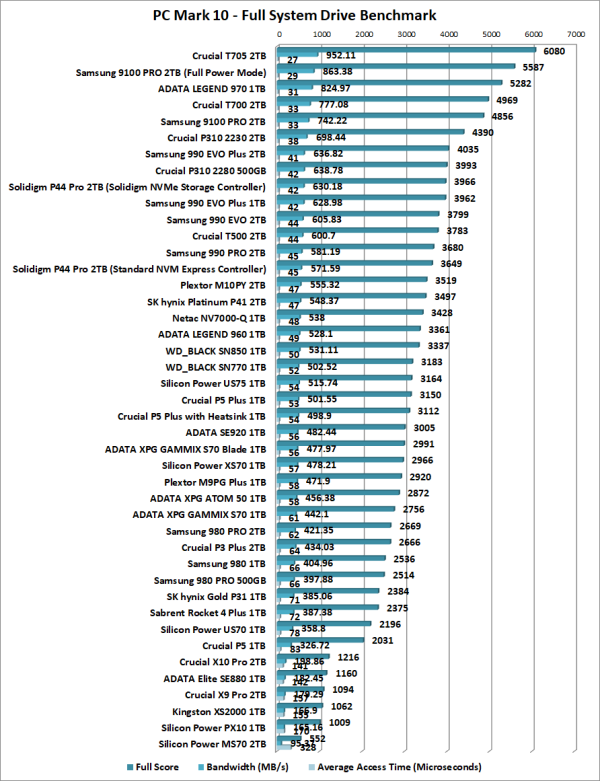
Out of the box, the 9100 PRO performed fairly well in PCMark 10's Full System Drive Benchmark. While not nearly as fast as the Crucial T705 and ADATA LEGEND 970, it performed better than all of the PCIe 4.0 drives we've tested. With the 9100 PRO in "full power mode" though, it jumped up near the top of the list, coming in a close second behind the Crucial T705.
Dynamic Thermal Guard:
While Samsung's NVMe SSDs offer impressive performance, they also generate a good amount of heat. To keep them from overheating, Samsung has implemented what they call Dynamic Thermal Guard (DTG). This technology monitors the temperature of a drive and will reduce its performance once it reaches a certain point.
With the 9100 PRO, Samsung has tried to prevent this drop in performance by dissipating heat more efficiently. The drive has a heat spreader built into the label on the back of the drive as well as a nickel coating on the Presto controller that helps dissipate heat faster. Otherwise, you can go all in and get the heatsink equipped version of the 9100 PRO.
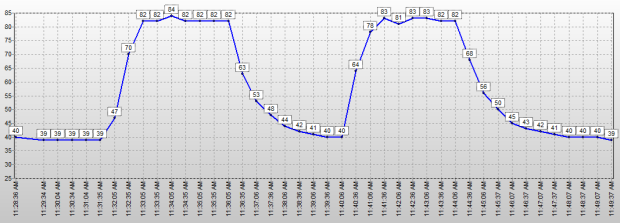
Without a heatsink, the 9100 PRO runs pretty hot. At idle, the drive's temperature hovered around 39 ºC. Under heavy loads, the drive reached temperatures as high as 84 ºC when reading and 83 ºC when writing. At this point, Dynamic Thermal Guard (DTG) was triggered, reducing the drive's transfer speed down to about 11,000 MB/s.
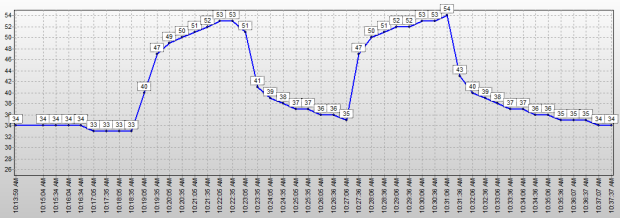
Using my motherboard's M.2 SSD heatsink, I saw a dramatic drop in temps. The 9100 RPO idled at around 34 ºC and reached temperatures as high as 53 ºC when reading and 54 ºC when writing. These temperatures had no impact on the drive's performance. No matter how hard I pushed it, the 9100 PRO did not throttle its read or write speeds in any noticeable way.
Final Thoughts:
Samsung has knocked another one out of the park with its new 9100 PRO SSD. Available with or without a heatsink, this M.2 form factor drive is powered by Samsung's new "Presto" controller and is equipped with up to 8TB of the company's 8th-generation V-NAND flash. Combine this with a large DRAM cache, Samsung's Intelligent TurboWrite 2.0 technology and an ultra-fast PCIe 5.0 x4 NVMe 2.0 interface and you have one of, if not the fastest consumer NVMe SSDs on the market today. In our sequential read and write tests, the 2TB version of the 9100 PRO was able to read at speeds as high as 14,778 MB/s and write at speeds in excess of 13,550 MB/s. It also did very well in our random write tests, producing more than 339,000 IOPS at low queue depths.
Of course, impressive performance isn't the only thing the 9100 PRO has to offer. Along with support for Samsung's Intelligent TurboWrite 2.0 technology, the drive features AES 256-bit full disk encryption and is compliant with both the TCG Opal 2.0 and IEEE 1667 specifications. Also, in addition to the optional heatsink, it employs a nickel coating on the controller as well as a heat spreader label for efficient thermal management. To top it all off, the drive works with Samsung's Magician software and is covered by a 5 year warranty.
The Samsung 9100 PRO is available now in 1TB, 2TB and 4TB capacities. Prices for the heatsink-less version currently range from $200 up to $550, with the 2TB version reviewed here retailing for about $300. Otherwise the heatsink-equipped version will run you about $20 more. The 8TB version is expected to ship in the second half of 2025. At this time, there is no word yet on how much it will be.

Highs:
- PCIe 5.0 x4 interface with NVMe 2.0 protocol
- Available in 1TB, 2TB, 4TB and 8TB capacities
- Equipped with Samsung's 8th generation V-NAND technology
- Excellent sequential and random read and write speeds
- Small M.2 2280 form factor
- Features Intelligent TurboWrite 2.0 technology
- Large DRAM cache
- AES 256-bit full disk encryption
- TCG Opal 2.0 and IEEE 1667 compliant
- Available with or without heatsink
- Works with Samsung's Magician software
- Works with PlayStation 5
- 5 year warranty
Lows:
- Requires high end CPU to reach maximum IOPs
- Can get very hot under heavy workloads
- Requires a heatsink
- Pricey
